
Research led by Dr. Carlos Arteaga, Director of the Harold C. Simmons Comprehensive Cancer Center, has identified potential targets for treatment of triple negative breast cancer, the most aggressive form of breast cancer.
Increased activity of two genes, MCL1 and MYC, is associated with the development of chemotherapy resistance. The increased action of these two genes boosts mitochondrial oxidative phosphorylation, which promotes the growth of chemotherapy-resistant cancer stem cells, the research showed.
“Alterations in these two genes are easily detectable with tumor gene tests in current use. Combinations of drugs that inhibit MCL1 or MYC, or both, have the potential to reduce the development of chemotherapy resistance and should be studied in clinical trials,” said Dr. Arteaga, Professor of Internal Medicine at UT Southwestern Medical Center. Dr. Arteaga holds The Lisa K. Simmons Distinguished Chair in Comprehensive Oncology.
Most breast cancers can be treated with hormone therapy, but about 15 percent of cases are triple negative breast cancer, meaning the cancer cells are not influenced by hormones like estrogen or progesterone. These triple negative breast cancers must, therefore, be treated with chemotherapy, which is toxic to healthy cells as well as cancer cells. Furthermore, most triple negative breast cancers eventually become resistant to chemotherapy and the cancer then spreads unchecked.
Drugs that inhibit activity of the MCL1 or MYC genes are in development, Dr. Arteaga said. These drugs, given in conjunction with standard chemotherapies, could potentially slow or even prevent the development of chemotherapy resistance, improving the outlook for this aggressive form of breast cancer.




